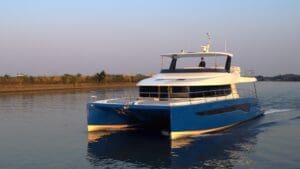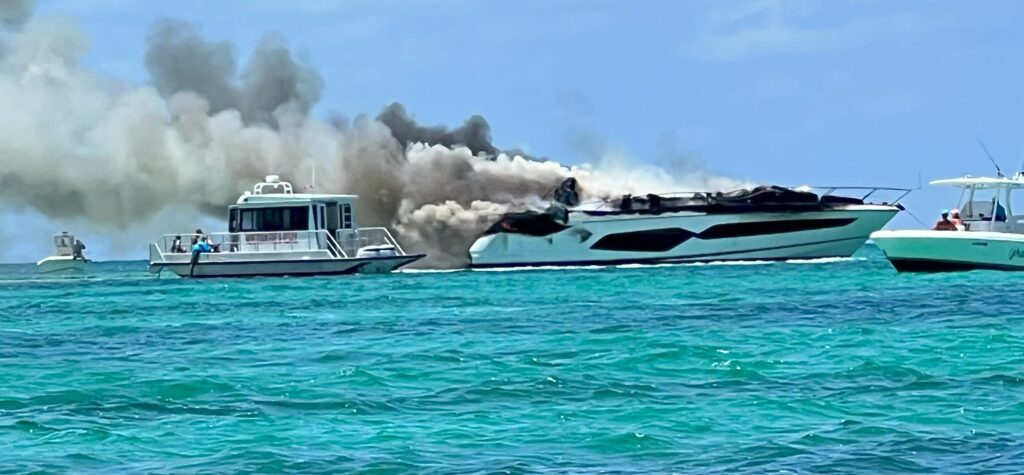
This scene here happened in the Bahamas last summer. This boat was in the marina in Hope Town and fortunately was quickly towed out into open water. This reminded us that a fire aboard a boat can start without much warning and spreads very quickly throughout the boat. It is terrifying and often heartbreaking for live-aboards who carry their worldly possessions on the boat.
Prevent fires by using good practices. Inspect your boat to look for defects, deferred maintenance, or other conditions that could cause a fire. Regularly maintain your boat to eliminate fire hazards and be extremely careful with lithium batteries in toys! This seems to be one of the biggest culprits for starting fires onboard.
Fire Detectors for Boats
Installing the right rating of smoke detector is important so that it will hold up to the harsh marine elements. But, also, when choosing a smoke detector, you can boost your chances of early detection by a model with detection devices that use both ionization and photoelectric methods.
- Ionization devices better detect small particles often generated by rapidly starting fires.
- Photoelectric devices better detect smoldering fires that generate smoke and fumes long before developing spreading flames.
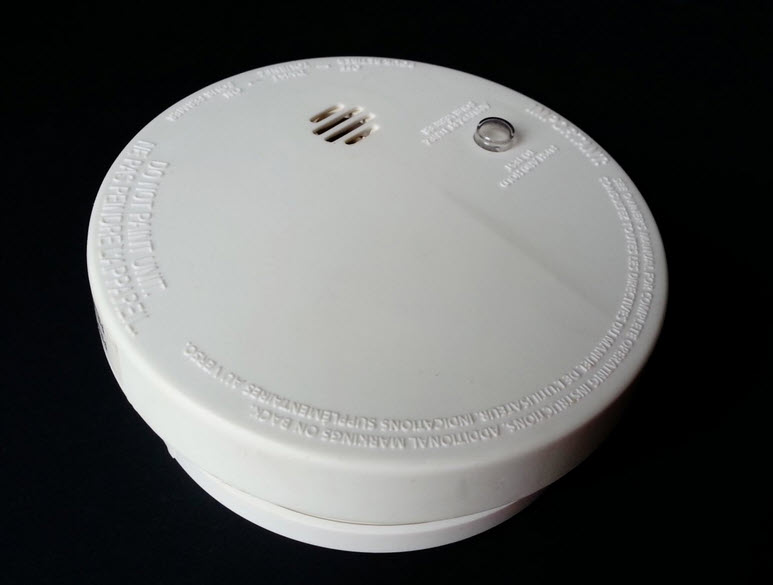
By choosing a unit that has both types of devices, you improve your chances of quick alert no matter the type of fire. By placing them everywhere aboard, you increase your chances of knowing about the fire no matter where it is locate.
You can find UL217 smoke detectors with both detection methods that either come with non-replaceable 10-year batteries or that you may insert your own batteries that must be replaced annually. Whichever you select, test frequently and because the detection can degrade over time especially in salty humid air, replace the smoke detection units every five years.
Extinguishing a Fire Aboard
Once fire is detected, it is vital that all crewmembers:
- Know where the fire equipment is and can access it without removing stored items from in front of it
- Know how to use the fire extinguishing equipment
- Know how to regularly maintain the equipment.
Local fire departments and for-hire emergency training facilities offer training on fire management skills in actual fires in a controlled setting. If you do not find that available for you and your regular crewmembers and frequent guests, look online for extinguisher training classes and videos.
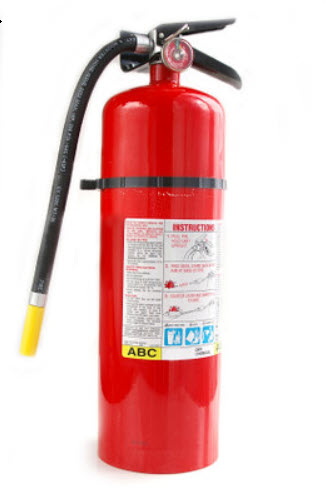
Live-aboards and those planning offshore cruising should consider taking the five-day Standards of Training, Certification and Watchkeeping (STCW) Certification course. The course teaches how to identify safety hazards and best practices for emergency response aboard. In addition to building fire-fighting skills using live fires, the course covers survival skills and first aid.
The U.S. Coast Guard issued updated fire extinguisher requirements in April 2022. For all boats requiring fire extinguishers, the new standards state fire extinguishers:
- Must be readily accessible
- Must be an approved type
- Must have been manufactured in the last 12 years
- Must not have been previously used
- Must be maintained in good and serviceable working condition with no visible signs of significant corrosion or damage.
- If the extinguisher has a pressure gauge reading or indicator, it must be in the operable range or position.
- Must be stored with the lock pin firmly in place
- Must have the discharge nozzle clean and free of obstruction.
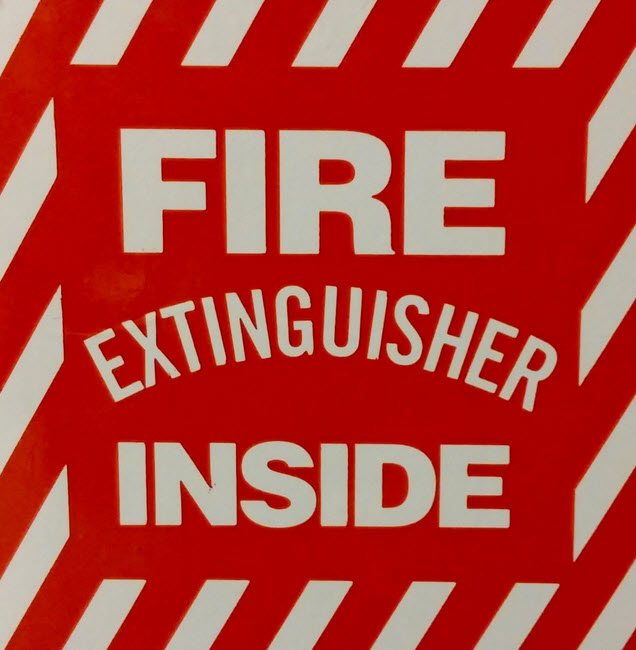
Unfortunately, testing and maintenance of fire extinguishing equipment is often an overlooked maintenance item.
Types of Boat Fire Extinguishers
The Coast Guard requires Class B portable fire extinguishers to be carried on board recreational vessels. These are effective against flammable liquid fires such as gasoline, petroleum, greases, oils, oil-based paints, solvents, and alcohols.
Another type of fire-fighting device is a condensed dry aerosol ball. The balls are 4-6 inches in diameter and contain a condensed dry chemical that is released within 3-5 seconds of being exposed to the heat of a flame. The small balls can be mounted in mechanical or electrical spaces where fires are likely to start or kept in convenient locations to be thrown by a crew member into a fire.
Fire Detection Aboard Boats
Fire prevention is important, but fast fire detection and extinguishing are vital. Just as in homes ashore, smoke detectors are indispensable to give the crew notice as soon as a fire starts.
The National Fire Protection Association (NFPA) develops codes, standards, recommended practices and guidelines for the prevention of fire, explosions, and for life safety in the event of a fire. While the NFPA has no power to police or enforce compliance with its recommended standards, any jurisdiction or entity that adopts or incorporates NFPA standards may enforce them as they see fit.
NFPA 302, Fire Protection Standard for Pleasure and Commercial Motor Craft, as updated in 2004, contains for the first time, a recommended requirement that smoke detectors be installed aboard pleasure boats. Specifically, Chapter 12, Section 12.3 entitled Smoke Detection, states: “All vessels 26′ or more in length with accommodation spaces intended
for sleeping shall be equipped with a single station smoke alarm that is listed to (Underwriters Laboratories) UL 217, Standard for Single and Multiple Station Smoke Alarms, for recreational vehicles and is installed and maintained according to the device manufacturer’s instructions.”
Smoke detectors designed for home use are not recommended for use on a boat as they
will likely not withstand the harsh marine environment. There are currently no smoke detectors that are UL listed for marine applications, the UL 217 listing refers to smoke detectors acceptable for use in a recreational vehicle. Unfortunately, when purchasing a smoke detector, you may find it stamped “UL listed”, but without a specific UL standard number or application on the device or packaging. This may make it difficult to find an appropriate smoke detector unless you are buying from a specialty store dealing with recreational vehicle or marine accessories and supplies.
Though generally not enforced, except perhaps by your insurance company, it makes sense to protect yourself, your crew, your boat, and its contents by going above and beyond the NFPA recommendation of installing one smoke detector. A UL 217 rated smoke detector should be placed in each living and sleeping area, the engine room/compartment, the lazarette, and behind electrical cabinets. Faster detection means you have a better chance to avoid abandoning ship and perhaps saving more possessions including the boat itself.





